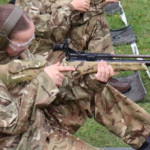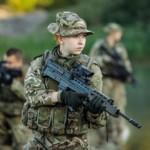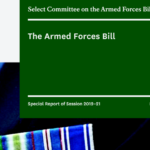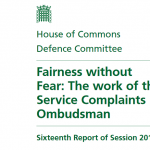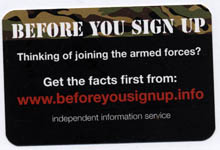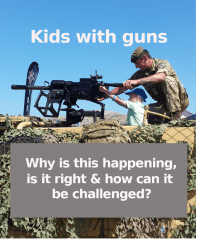The UK is the only country in Europe that recruits 16 year olds into the armed forces and currently one quarter of British Army recruits are under 18. Much of our early work focused on campaigning to raise the minimum age of recruitment to 18 years.
Concerns about the way that young people are not supported to make an informed choice about enlistment – and the consequences of this – were at the heart of our decision to set up ForcesWatch. The armed forces target recruitment activities at children and teenagers, and are involved in the education system and youth organisations and visible in many online and gaming platforms. Military life is promoted in a sanitised and glamourised way, without concern for the risks and ethical questions it poses.
Research over the last 15 years has indicated again and again that military environments are not suitable for those under the age of 18. Even though personnel are not deployed until they are adults, they face significant risks during training. Many drop out before completing training or after very short careers, and often face further difficulties. Youth and pre-existing vulnerabilities can make the impact much greater than for older recruits. They, and all armed forces personnel, face restrictive terms and conditions of service. Military institutions are not adequately accountable in relation to their duty of care for individuals within them, and there are high levels of bullying, harassment and assault. The military justice system often exacerbates the harmful impact and the limited reforms that have been implemented have yet to address the scale of the problem.
We continue to monitor recruitment practices – including military marketing – and the wider politics and culture around recruitment to the armed forces.
We support the work of partner organisations to highlight concerns and risks, and to ask questions about the ethics of armed forces recruitment practices and the moral impact of military service.
Child Rights International Network (CRIN) are leading the campaign to raise the age of recruitment into the UK armed forces. You can find their briefings, reports and other materials here.
If you are thinking of joining the armed forces – or you know someone who is – Before You Sign Up is a valuable resource for information and questions. See more resources here.
Useful resources
Selling the military: A critical analysis of contemporary recruitment marketing in the UK
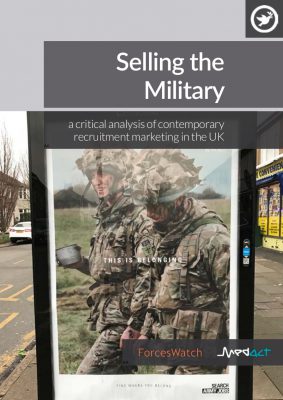 This report, written by ForcesWatch and published with the public health charity Medact, analyses the way the armed forces market their careers to adolescents and young people, creating powerful messages that which exploit developmental vulnerabilities and social inequality, risking the health and well-being of recruits. Narratives of camaraderie and self-development also serve to promote an uncontroversial and depoliticised idea of the military more widely which promote self-fulfilment in the context of conflict.
This report, written by ForcesWatch and published with the public health charity Medact, analyses the way the armed forces market their careers to adolescents and young people, creating powerful messages that which exploit developmental vulnerabilities and social inequality, risking the health and well-being of recruits. Narratives of camaraderie and self-development also serve to promote an uncontroversial and depoliticised idea of the military more widely which promote self-fulfilment in the context of conflict.
Public poll on minimum age of armed forces recruitment
Submission to the Human Rights and the Scottish Parliament inquiry
 This submission made by ForcesWatch and Quakers in Scotland to the Scottish Parliament's human rights inquiry details our concerns around the need for regulation and transparent accountability of military activities in schools, the lack of education about peace and human rights, and the continued recruitment of children into the UK armed forces.
This submission made by ForcesWatch and Quakers in Scotland to the Scottish Parliament's human rights inquiry details our concerns around the need for regulation and transparent accountability of military activities in schools, the lack of education about peace and human rights, and the continued recruitment of children into the UK armed forces.
Evidence submitted to the Armed Forces and Veterans Mental Health Inquiry
The First Ambush: Effects of army training and employment
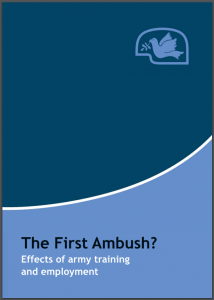 This report from Veterans For Peace UK details how the Army's training process has a forceful impact on attitudes, health, and behaviour even before recruits are sent to war. The findings show that military training and culture combine with pre-existing issues (such as a childhood history of anti-social behaviour) to increase the risk of violence and alcohol misuse. Traumatic war experiences further exacerbate the problem.
This report from Veterans For Peace UK details how the Army's training process has a forceful impact on attitudes, health, and behaviour even before recruits are sent to war. The findings show that military training and culture combine with pre-existing issues (such as a childhood history of anti-social behaviour) to increase the risk of violence and alcohol misuse. Traumatic war experiences further exacerbate the problem.
Soldiers at 16 – The other side of the story
Does the military give young people a ‘leg up’? The armed forces and social mobility
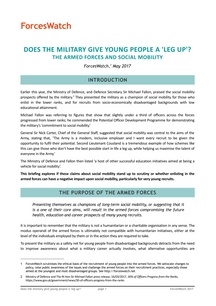
This briefing explores if these claims about social mobility stand up to scrutiny or whether enlisting in the armed forces can have a negative impact upon social mobility, particularly for very young recruits.
Is it Counterproductive to Enlist Minors into the Army?
The Recruitment of Children by the UK Armed Forces: a Critique from Health Professionals
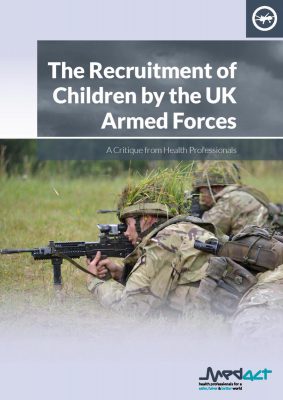 Medact’s report on the long-term impacts of the British military’s recruitment of children under the age of 18, presents evidence linking ‘serious health concerns’ with the policy, and calls for a rise in the minimum recruitment age. It looks at the psychological and psychosocial vulnerabilities of adolescents in the context of military recruitment marketing strategies and making long-term risky decisions and examines the evidence that under 18 recruits face greater risks to health than adult recruits, across the course of an armed forces career.
Medact’s report on the long-term impacts of the British military’s recruitment of children under the age of 18, presents evidence linking ‘serious health concerns’ with the policy, and calls for a rise in the minimum recruitment age. It looks at the psychological and psychosocial vulnerabilities of adolescents in the context of military recruitment marketing strategies and making long-term risky decisions and examines the evidence that under 18 recruits face greater risks to health than adult recruits, across the course of an armed forces career.

